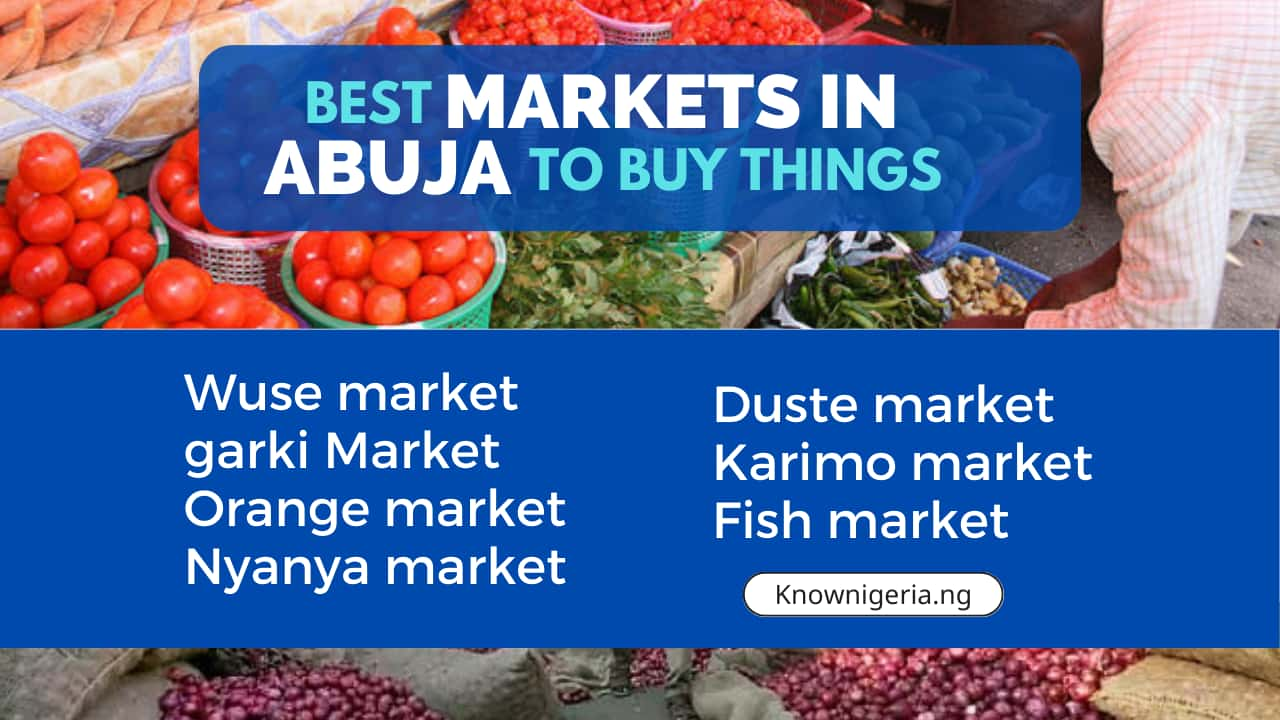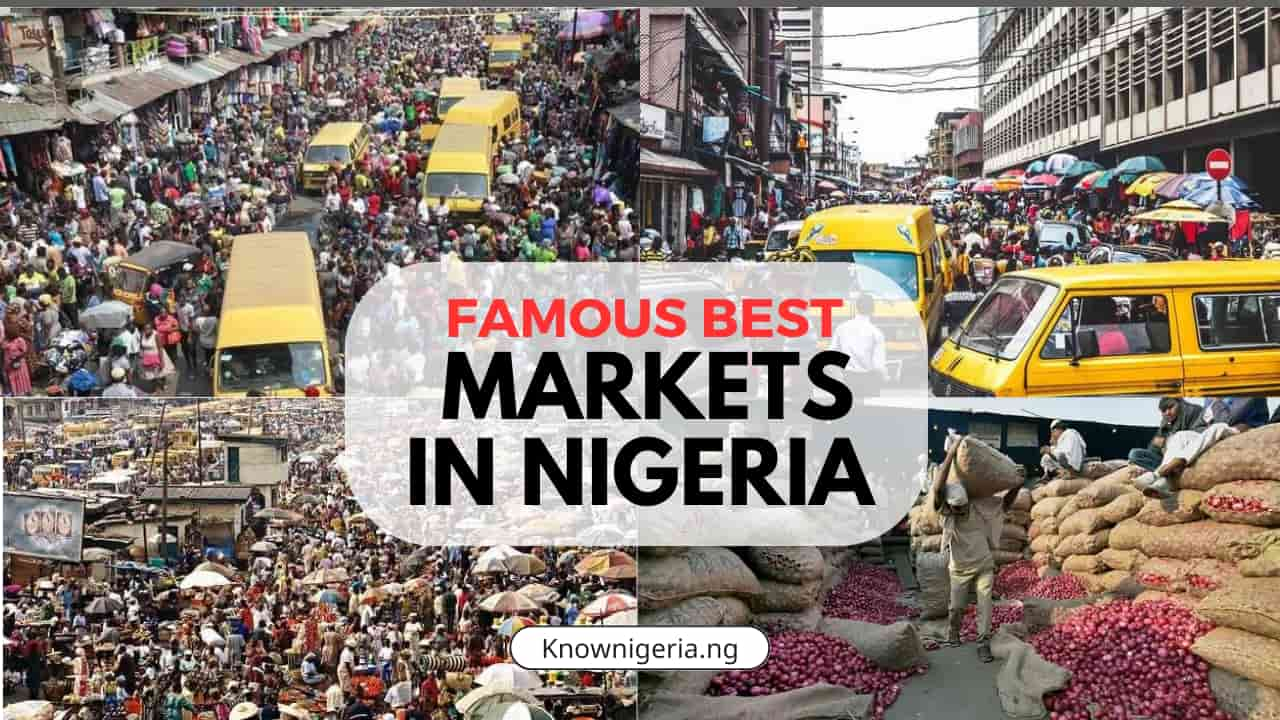Lagos is a city that takes pleasure in being a hub for business, and the city has its bustling marketplaces to prove it. Lagos makes shopping a memorable and enjoyable experience with its wide marketplaces and big, elegant malls.
It is important to take note of which markets are well-liked for whatever products or services before shopping. Additionally, certain marketplaces provide greater prices than others, especially if you have a sharp tongue and are skilled at haggling.
Read on and check out the 10 Popular Markets In Lagos Nigeria.
Let’s dive in.
Visit 13 Famous Best Markets in Nigeria
Table of Contents
10 Popular Markets In Lagos Nigeria
1. Alaba International Market
Alaba International Market stands out among all the organized electronics fairs in Africa and it is regarded as one of the popular markets in Lagos Nigeria. Alaba, Ojo is a well-known electronics market in Lagos. Customers from nearby nations also frequent the market. Its status as a global market is, therefore, legitimate. The market is open every day, excluding Sundays and other holidays.
Absent appendages and sub-shops, Alaba Market has more than 5,000 stores. In this market, daily transactions involve more than two million people. The market may be reached from Badagry through Iyana Iba or Volks on the Badagry-Oshodi-Apapa Expressway. It can also be reached anywhere in Lagos via Mile 2/Festac Town to Volks.

2. Balogun Market
Balogun Market in Lagos draws many tourists daily from around Nigeria and that is why it is considered one of the popular markets in Lagos Nigeria. This market serves as the main source of income for many families who depend on it for their daily needs.
On particular market days, traders who import and resell things gather at the market as early as 5:00 AM to buy and sell their products. Some vendors get up even earlier to buy products from wholesalers and resell them to customers in the same marketplace.
A one-stop shop with practically everything you require is Balogun Market. There are several categories for various products and services, such as clothing, food, accessories, and bridal accessories. It is the go-to place for “Asoebi” for weddings and other special occasions.
3. Computer Village
The biggest technology market in Africa and Nigeria is Computer Village, located in Ikeja, Lagos. The main employers are well-known phone sales stores, laptop stores, phone accessory stores, phone repairers, and sim activation stores.
Except on Sundays and legal holidays, the market is open every day. Since no dealers within the market influence the pricing of goods, it is a perfect market. The reason for this is that the dealers engage in healthy competition. A busy center for technology goods and services, the market began as a small collection of stores in the late 1990s.
One of the busiest markets in Lagos Nigeria, Computer Village averages 100,000 visitors per day. The market generates an estimated $2 billion or more in annual income. In addition, computer Village is a significant marketplace for smartphones, computers, accessories, and other electronic devices.
The market is renowned for its enormous product selection, affordable rates, and top-notch customer support. With over 3,000 establishments and thousands of employees, Computer Village significantly contributes to the Nigerian economy.
The market is home to a thriving population of knowledgeable technicians that provide upkeep and repair services for various technical devices.

4. Ladipo Market
Ladipo market, situated in Mushin, Lagos, is well known for serving as Nigeria’s main marketplace for spare components. The market is a gathering place for mechanics, car owners, and those looking for reasonably used vehicles, replacement parts, and phones. The market is well-liked and well-located, making it convenient for people looking for these things.
Igbo business people who have made a career selling vehicle components predominate the market. The market, which has over 10,000 businesses, offers a variety of goods to meet the various demands of its patrons. Ladipo Market carries all the essentials for a car, including electrical parts, brakes, wheels, and suspension systems.
Their prices at Ladipo Market are competitive and reasonable. The ability to buy reasonably used car components, which offers a cost-effective choice for people wishing to fix their vehicles, is one distinctive element of this industry. Despite the accessibility of used components, the market’s traders and mechanics are skilled at preserving the quality of the goods.
If you are in Abuja or traveling to Abuja, it would be important to know the markets in Abuja
5. Tejuosho Market
Tejuosho market in Lagos has experienced an amazing transition from its previous chaotic and noisy state into an ultra-modern market with a gorgeous setting. The market serves as a nexus for several companies, including money changers, gold dealers, and retailers of clothing and curtains, making it a great location for inexpensive shopping. Many people move around in the busy, dynamic atmosphere at Tejuosho’s night market.
However, because pickpockets are known to operate in the neighborhood, visitors should exercise caution. Nevertheless, despite this, the Tejuosho market is still a great place and one of the best markets in Lagos Nigeria.

6. Oshodi Market
Oshodi is a significant area in Lagos. After the previous market in Owonifari was demolished, the new one is now located at Isopakodowo. More than 600 stores and hundreds of kee Clamps are housed in the new market. Oshodi has Asoebi marketers, food vendors, and fruit vendors.
A first-story structure in Nigeria is another option. The market is thought to be dominated by handbag snatchers and pickpockets. However, due to the reasonable prices of the goods, many people continue to purchase in the Oshodi market.
7. Mile 12 Market
The Mile 12 market is known for selling cheap, perishable food goods in large quantities to Lagos residents and Nigerians and for imports. The market is around 30 years old and has provided numerous advantages to people nearby and afar.
It is situated in Lagos State’s Ketu Local Government region. Fruits, tomatoes, peppers, onions, yams, yam flour, vegetable and palm oils, and several other edible food products are among the food items sold here. In addition, there are other non-edible goods for sale.
There are various hawkers outside the market. Many individuals move from one area of the market to another while they are there. Purchasing food in quantity from the Mile 12 market will help you save money.
The Mile 12 market in Lagos is well renowned for being the biggest market for perishable foods in Nigeria and one of the biggest in West Africa. Mile 12 Market is also one of the best and most popular markets in Lagos Nigeria.
Several thousand metric tons of food are traded daily in the market, which deals with a huge volume of food products. Moreover, with produce sourced from diverse world regions, it is a significant food delivery hub for Lagos and other parts of Nigeria.

8. Aswani
Aswani, which is in the industrial area of Isolo, Lagos, is well known for its reasonably used clothing and footwear, often known as “Okrika” or “second hand.” Tuesday is market day, and the market is full on that day. Like in many markets in Lagos Nigeria, there are tiny portions of food and other non-clothing items for sale. Despite being open every day of the week, the market only sells shoes and bags on Mondays. Tuesdays are the busiest trading days.
It is one of the markets in Lagos Nigeria where one may get the most affordable goods. It is close to the office of the Isolo Local Government Council. Aswani market takes pride in offering outrageous prices on reasonably worn goods. Here, clothing may be purchased for as little as 100 Naira.
Additionally, many people sell new clothes, goods, purses, shoes, undergarments, and even food products in the yard. Bring any damaged electrical tools or equipment (such as a broken blender or iron) to Aswani, where you can get it fixed for as little as 300 to 500 Naira.
9. Jankara Market
Jankara Market is a significant and one of the well-known markets in Lagos Nigeria. It is a major distribution center for locally produced commodities such as ceramics, pirated cassettes, apparel, trade beads, and tie-dyed garments. Igbo dealers are thought to dominate the market.
The market prides itself on offering goods and services at reasonable and competitive pricing.

10. Oyingbo Market
Oyingbo market is well-liked because of how many transactions happen there every day. It has developed a name for itself as one of Nigeria’s top marketplaces to the point where a musician included it in the lyrics to one of his songs. “The Oyingbo market misses no one’s absence,” the line said.
The market is frequently crowded with vendors and their customers at all times of the day. The Lagos food market is quite important. Oyingbo Market is as well considered one of the popular markets in Lagos Nigeria.
See also Best Markets in Abuja to Buy Things
Frequently Asked Questions
What Lagos market is the oldest?
In the Nigerian state of Lagos, the settlement of Ebute Ero is home to the Ebute Ero Market. Near Brown Square, Ebute Ero Market is located south of Makoko. One of Nigeria’s largest and oldest markets is this one.
Which Lagos market is the best?
Balogun Market. The biggest market in the city, offering fabrics, shoes, purses, and other fashion accessories created both locally and abroad. Lagos Island is centered around Balogun Market.
Where in Lagos is the most expensive?
Banana Island. One of the priciest spots to purchase land in the city is this affluent neighborhood in Lagos’ Ikoyi district. So it’s not surprising that Banana Island has become a top choice for upscale real estate investors, given its reputation for exclusivity and splendor.
Conclusion
A market is essential to every culture that allows for human settlement. There are several marketplaces in Lagos, but just a few are distinctive. First, check out the 10 Popular Markets In Lagos Nigeria, as discussed earlier in this article.
If you like the content we bring to you, we know you would love the awesome contents we put out on our Youtube channel, Tiktok, Facebook, Instagram, and Twitter. Please subscribe and follow us for more Premium Know Nigeria content.
References
- www.privateproperty.com.ng
- propertypro.ng










